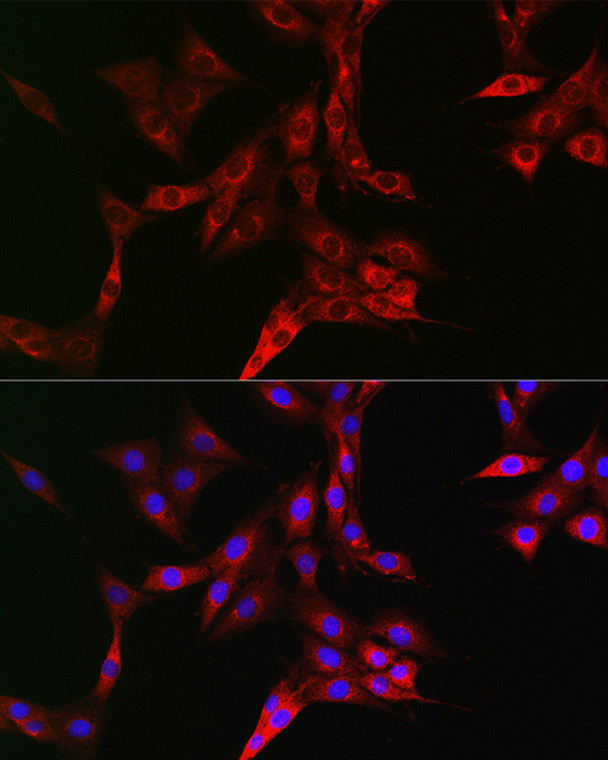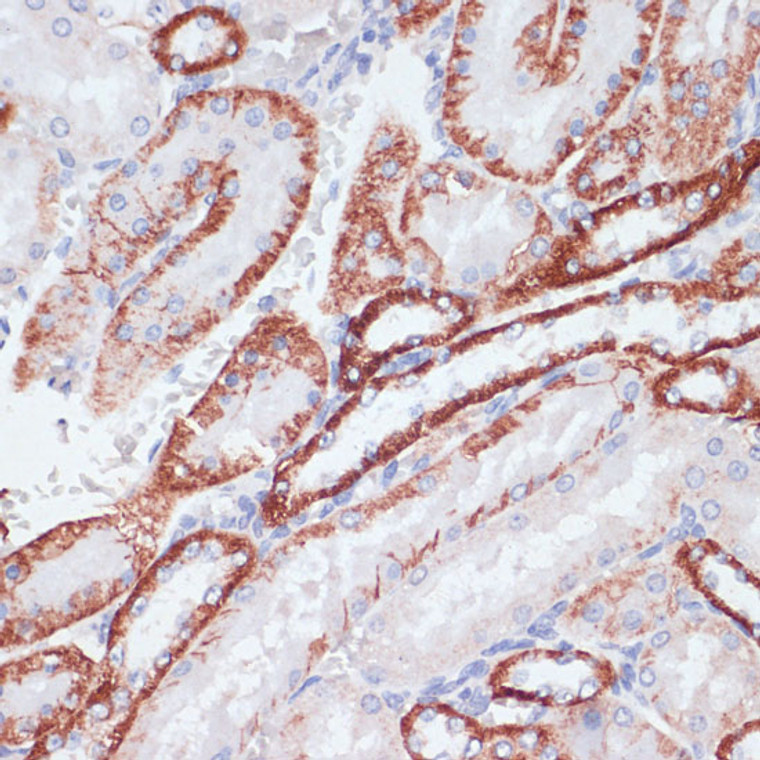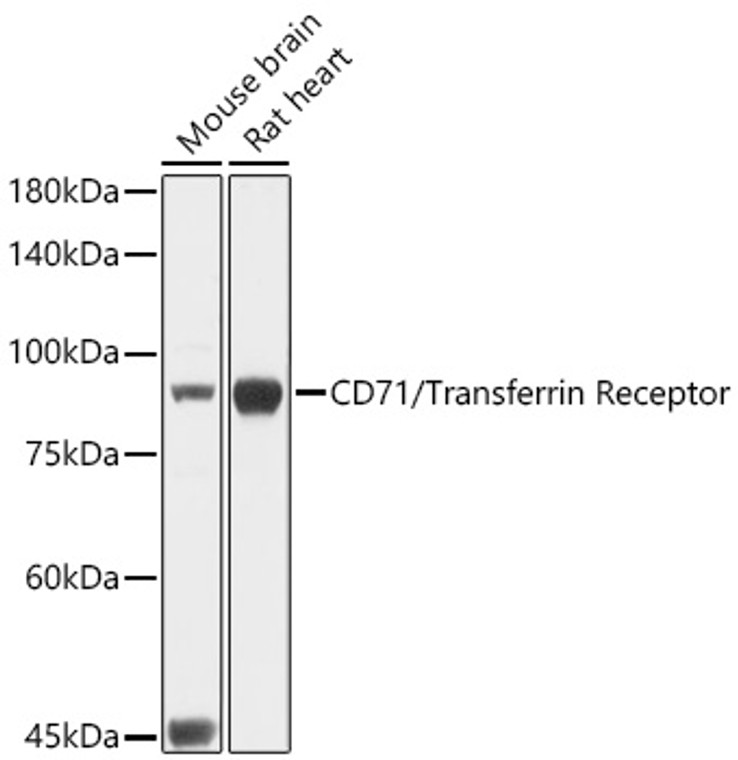| Host: |
Rabbit |
| Applications: |
WB/IHC/IF/IP |
| Reactivity: |
Human/Mouse/Rat |
| Note: |
STRICTLY FOR FURTHER SCIENTIFIC RESEARCH USE ONLY (RUO). MUST NOT TO BE USED IN DIAGNOSTIC OR THERAPEUTIC APPLICATIONS. |
| Short Description: |
Rabbit polyclonal antibody anti-TFRC (1-760) is suitable for use in Western Blot, Immunohistochemistry, Immunofluorescence and Immunoprecipitation research applications. |
| Clonality: |
Polyclonal |
| Conjugation: |
Unconjugated |
| Isotype: |
IgG |
| Formulation: |
PBS with 0.05% Proclin300, 50% Glycerol, pH7.3. |
| Purification: |
Affinity purification |
| Dilution Range: |
WB 1:500-1:1000IHC-P 1:50-1:200IF/ICC 1:50-1:200IP 1:50-1:200 |
| Storage Instruction: |
Store at-20°C for up to 1 year from the date of receipt, and avoid repeat freeze-thaw cycles. |
| Gene Symbol: |
TFRC |
| Gene ID: |
7037 |
| Uniprot ID: |
TFR1_HUMAN |
| Immunogen Region: |
1-760 |
| Immunogen: |
Recombinant fusion protein containing a sequence corresponding to amino acids 1-760 of human CD71/Transferrin Receptor (NP_001121620.1). |
| Immunogen Sequence: |
MMDQARSAFSNLFGGEPLSY TRFSLARQVDGDNSHVEMKL AVDEEENADNNTKANVTKPK RCSGSICYGTIAVIVFFLIG FMIGYLGYCKGVEPKTECER LAGTESPVREEPGEDFPAAR RLYWDDLKRKLSEKLDSTDF |
| Post Translational Modifications | Stearoylated by ZDHHC6 which inhibits TFRC-mediated activation of the JNK pathway and promotes mitochondrial fragmentation. Stearoylation does not affect iron uptake. N- and O-glycosylated, phosphorylated and palmitoylated. The serum form is only glycosylated. Proteolytically cleaved on Arg-100 to produce the soluble serum form (sTfR). Palmitoylated on both Cys-62 and Cys-67. Cys-62 seems to be the major site of palmitoylation. |
| Function | Cellular uptake of iron occurs via receptor-mediated endocytosis of ligand-occupied transferrin receptor into specialized endosomes. Endosomal acidification leads to iron release. The apotransferrin-receptor complex is then recycled to the cell surface with a return to neutral pH and the concomitant loss of affinity of apotransferrin for its receptor. Transferrin receptor is necessary for development of erythrocytes and the nervous system. A second ligand, the heditary hemochromatosis protein HFE, competes for binding with transferrin for an overlapping C-terminal binding site. Positively regulates T and B cell proliferation through iron uptake. Acts as a lipid sensor that regulates mitochondrial fusion by regulating activation of the JNK pathway. When dietary levels of stearate (C18:0) are low, promotes activation of the JNK pathway, resulting in HUWE1-mediated ubiquitination and subsequent degradation of the mitofusin MFN2 and inhibition of mitochondrial fusion. When dietary levels of stearate (C18:0) are high, TFRC stearoylation inhibits activation of the JNK pathway and thus degradation of the mitofusin MFN2. (Microbial infection) Acts as a receptor for new-world arenaviruses: Guanarito, Junin and Machupo virus. |
| Protein Name | Transferrin Receptor Protein 1TrTfrTfr1TrfrT9P90Cd Antigen Cd71 Cleaved Into - Transferrin Receptor Protein 1 - Serum FormStfr |
| Database Links | Reactome: R-HSA-432722Reactome: R-HSA-8856825Reactome: R-HSA-8856828Reactome: R-HSA-8980692Reactome: R-HSA-9013026Reactome: R-HSA-9013106Reactome: R-HSA-9013148Reactome: R-HSA-9013149Reactome: R-HSA-9013404Reactome: R-HSA-9013406Reactome: R-HSA-9013407Reactome: R-HSA-9013408Reactome: R-HSA-9013409Reactome: R-HSA-9013423Reactome: R-HSA-917977Reactome: R-HSA-9696270Reactome: R-HSA-9696273 |
| Cellular Localisation | Cell MembraneSingle-Pass Type Ii Membrane ProteinMelanosomeIdentified By Mass Spectrometry In Melanosome Fractions From Stage I To Stage IvTransferrin Receptor Protein 1Serum Form: Secreted |
| Alternative Antibody Names | Anti-Transferrin Receptor Protein 1 antibodyAnti-Tr antibodyAnti-Tfr antibodyAnti-Tfr1 antibodyAnti-Trfr antibodyAnti-T9 antibodyAnti-P90 antibodyAnti-Cd Antigen Cd71 Cleaved Into - Transferrin Receptor Protein 1 - Serum Form antibodyAnti-Stfr antibodyAnti-TFRC antibody |
Information sourced from Uniprot.org
12 months for antibodies. 6 months for ELISA Kits. Please see website T&Cs for further guidance










![Western blot analysis of lysates from wild type (WT) and CD71/Transferrin Receptor knockout (KO) HeLa cells, using [KO Validated] CD71/Transferrin Receptor Rabbit polyclonal antibody (STJ11100056) at 1:5000 dilution. Secondary antibody: HRP Goat Anti-Rabbit IgG (H+L) (STJS000856) at 1:10000 dilution. Lysates/proteins: 25 Mu g per lane. Blocking buffer: 3% nonfat dry milk in TBST. Detection: ECL Basic Kit. Exposure time: 1s. Western blot analysis of lysates from wild type (WT) and CD71/Transferrin Receptor knockout (KO) HeLa cells, using [KO Validated] CD71/Transferrin Receptor Rabbit polyclonal antibody (STJ11100056) at 1:5000 dilution. Secondary antibody: HRP Goat Anti-Rabbit IgG (H+L) (STJS000856) at 1:10000 dilution. Lysates/proteins: 25 Mu g per lane. Blocking buffer: 3% nonfat dry milk in TBST. Detection: ECL Basic Kit. Exposure time: 1s.](https://cdn11.bigcommerce.com/s-zso2xnchw9/images/stencil/300x300/products/89127/357577/STJ11100056_1__62720.1713121708.jpg?c=1)

